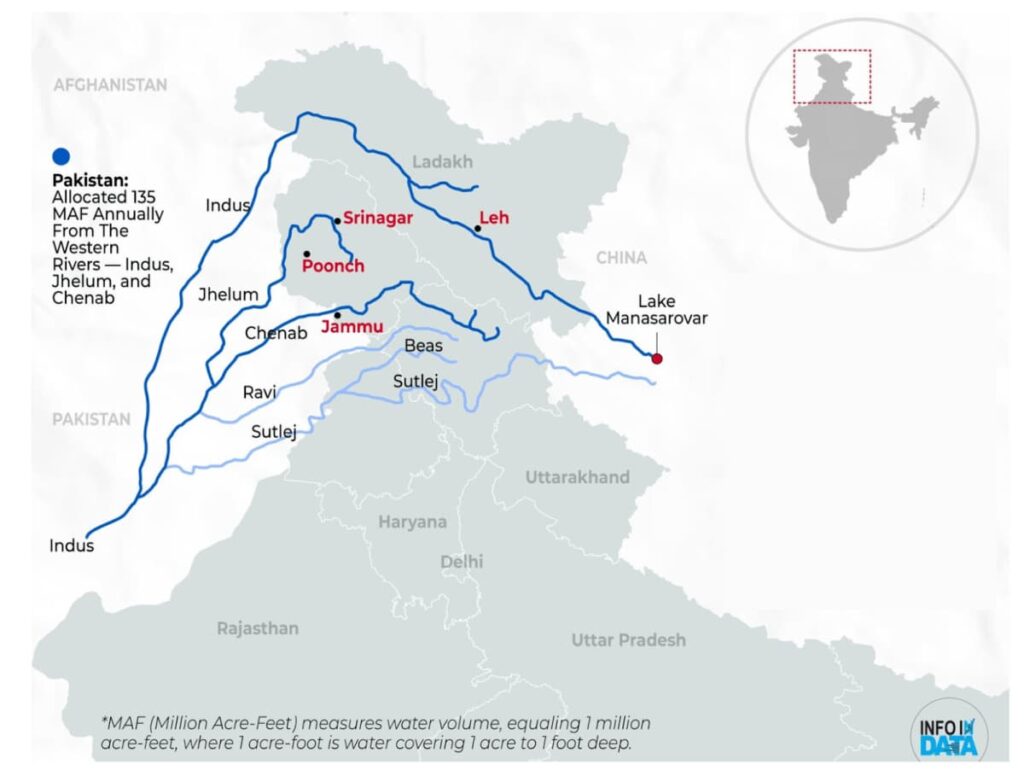Context: In the wake of the deadly terrorist attack in Pahalgam, India has announced that the Indus Waters Treaty of 1960 will be held in abeyance with immediate effect, until Pakistan credibly and irrevocably abjures its support for cross-border terrorism.
Indus Waters Treaty (IWT) – Key Points
Background:
Signed in 1960 by India and Pakistan, with the World Bank as a facilitator, the treaty governs water sharing from the Indus River System.Water Sharing Arrangement:
India receives 20% of the total water.
Pakistan receives 80%.
Eastern Rivers (India’s Share):
Ravi, Beas, Sutlej
Allocated to India for unrestricted use, including agriculture, domestic, and industrial purposes.
Western Rivers (Pakistan’s Share):
Indus, Jhelum, Chenab
Allocated largely to Pakistan.
India allowed non-consumptive use: agriculture, and ‘run-of-the-river’ hydropower projects with limited storage.
Permanent Indus Commission (PIC):
A bilateral commission with appointed commissioners from both countries.
Facilitates cooperation, data exchange, and conflict resolution.

🇮🇳 Significance for India
Strategic Leverage:
Suspending the treaty offers India greater control over the Indus River system and options to pressure Pakistan diplomatically and strategically.
Data Withholding:
India can stop sharing hydrological data and river flow information with Pakistan, which is critical for forecasting and water management.
Operational Freedom:
India gains freedom from design and operational restrictions on water usage, particularly on the Western Rivers (Indus, Jhelum, Chenab).
Reservoir Development:
India can build storage infrastructure on the Western Rivers, which could help in water management and drought mitigation.
Reservoir Flushing at Kishenganga:
India can now perform reservoir flushing, improving the Kishenganga hydropower project’s efficiency and lifespan.
Halting Pakistani Oversight:
Pakistan’s officials can be barred from inspecting Indian hydropower projects under construction like:
Kishenganga HEP (on a Jhelum tributary)
Ratle HEP (on the Chenab)
🇵🇰 Limited Options for Pakistan
No Exit Clause in IWT:
The Treaty cannot be abrogated unilaterally by either country.
It has no end date and requires mutual consent for any changes.
Weak Dispute Resolution Leverage:
Mechanism includes:
Permanent Indus Commission
Neutral Expert
Court of Arbitration
However, this system is effective only if India chooses to remain within the Treaty’s framework.
No Legal Recourse for Treaty Enforcement:
If India revokes or ignores the treaty, Pakistan cannot compel enforcement.
The ICJ is not an option due to India’s reservation under the ICJ statute, which blocks Pakistan from bringing a case.
No Provision for Suspension or Revival:
IWT lacks clauses on treaty suspension or revival, leaving no legal avenue for Pakistan to force reinstatement.
